Here’s the coronavirus death toll through December 13. The raw data from Johns Hopkins is here.
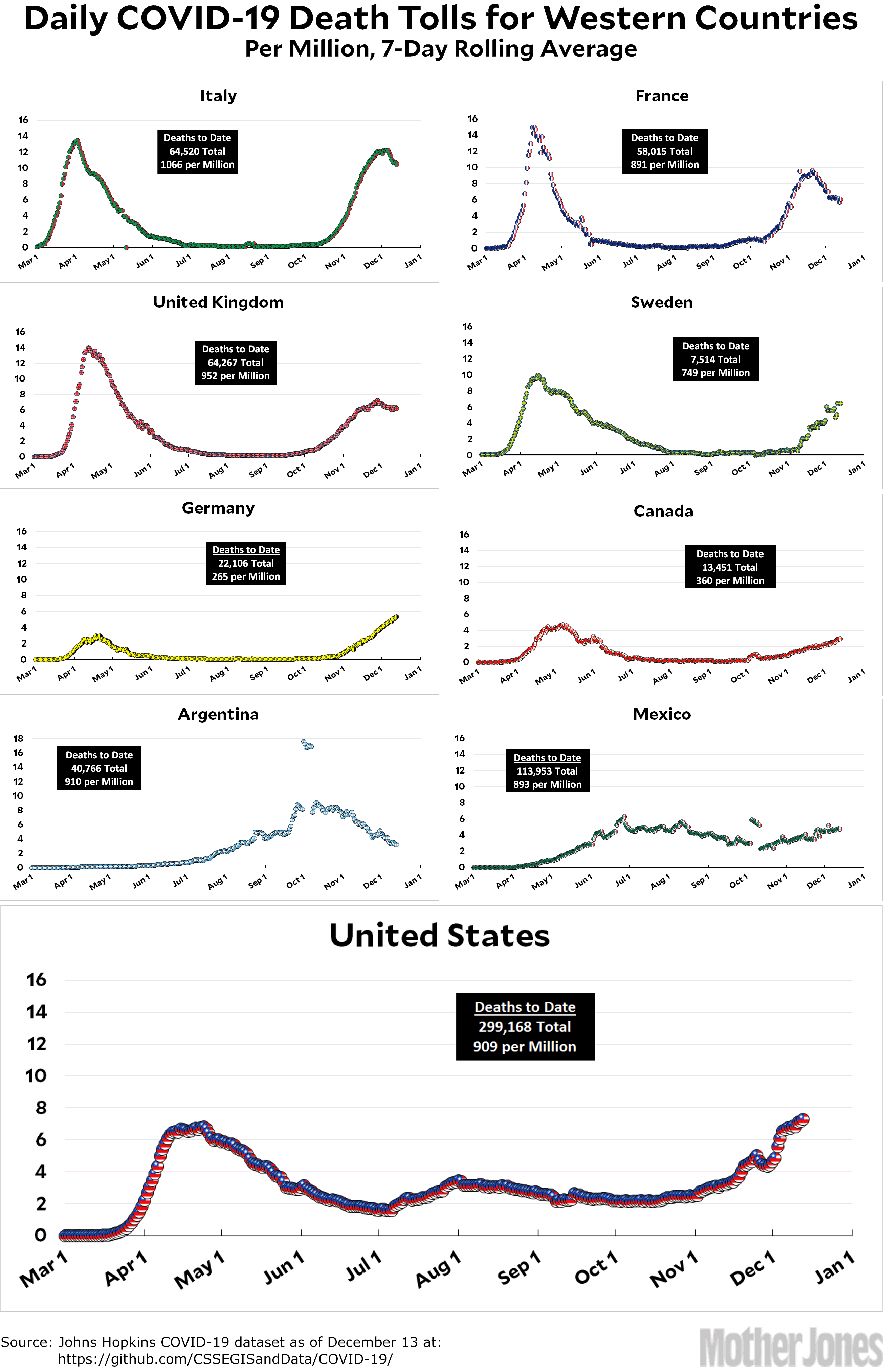

Here’s the coronavirus death toll through December 13. The raw data from Johns Hopkins is here.

Here’s the coronavirus death toll through December 12. The raw data from Johns Hopkins is here.
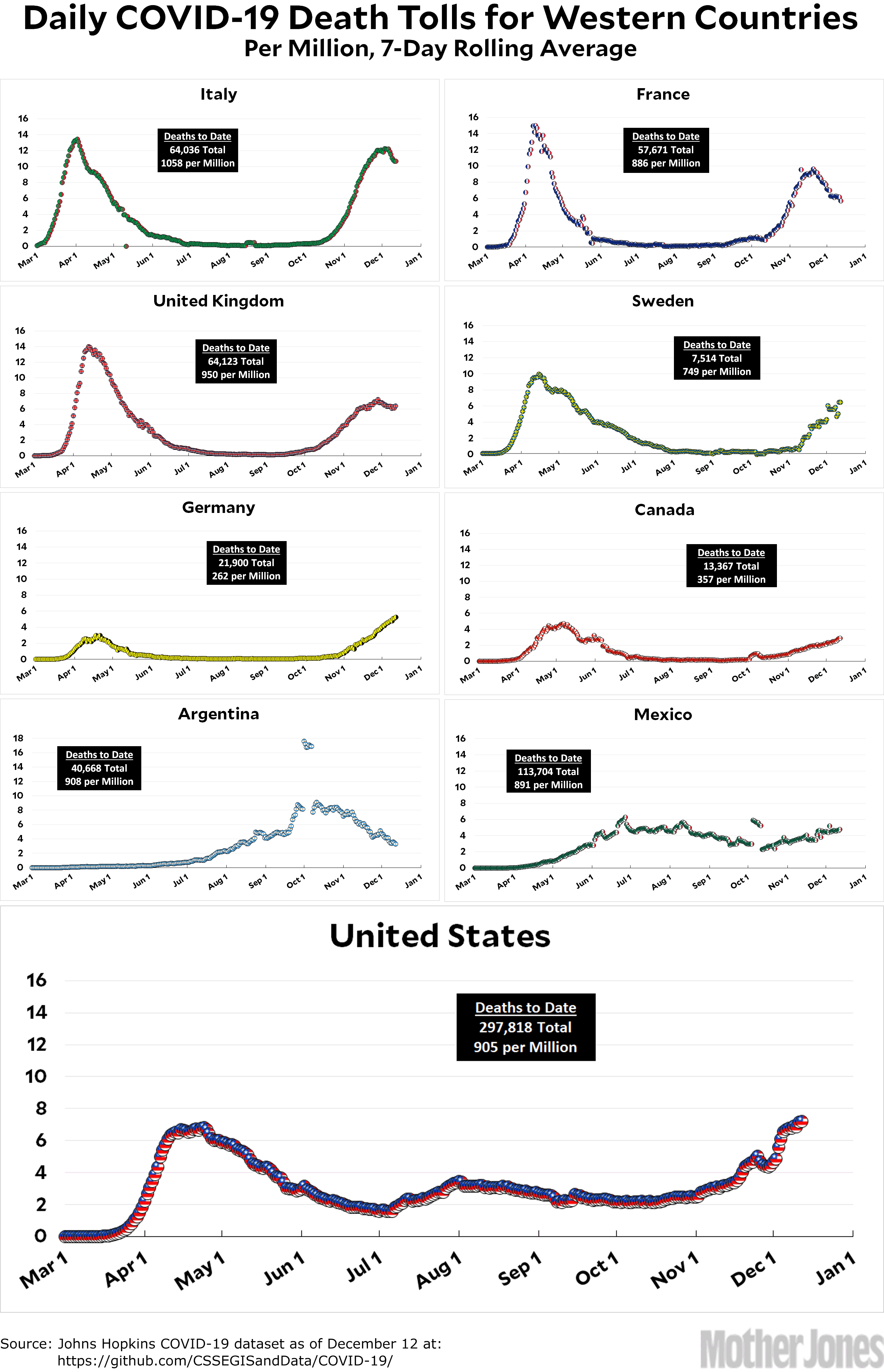
The United States recorded more than 3,000 deaths from COVID-19 yet again on Friday, and our rolling average daily mortality rate rose above 7 per million.
Here’s the coronavirus death toll through December 11. The raw data from Johns Hopkins is here.
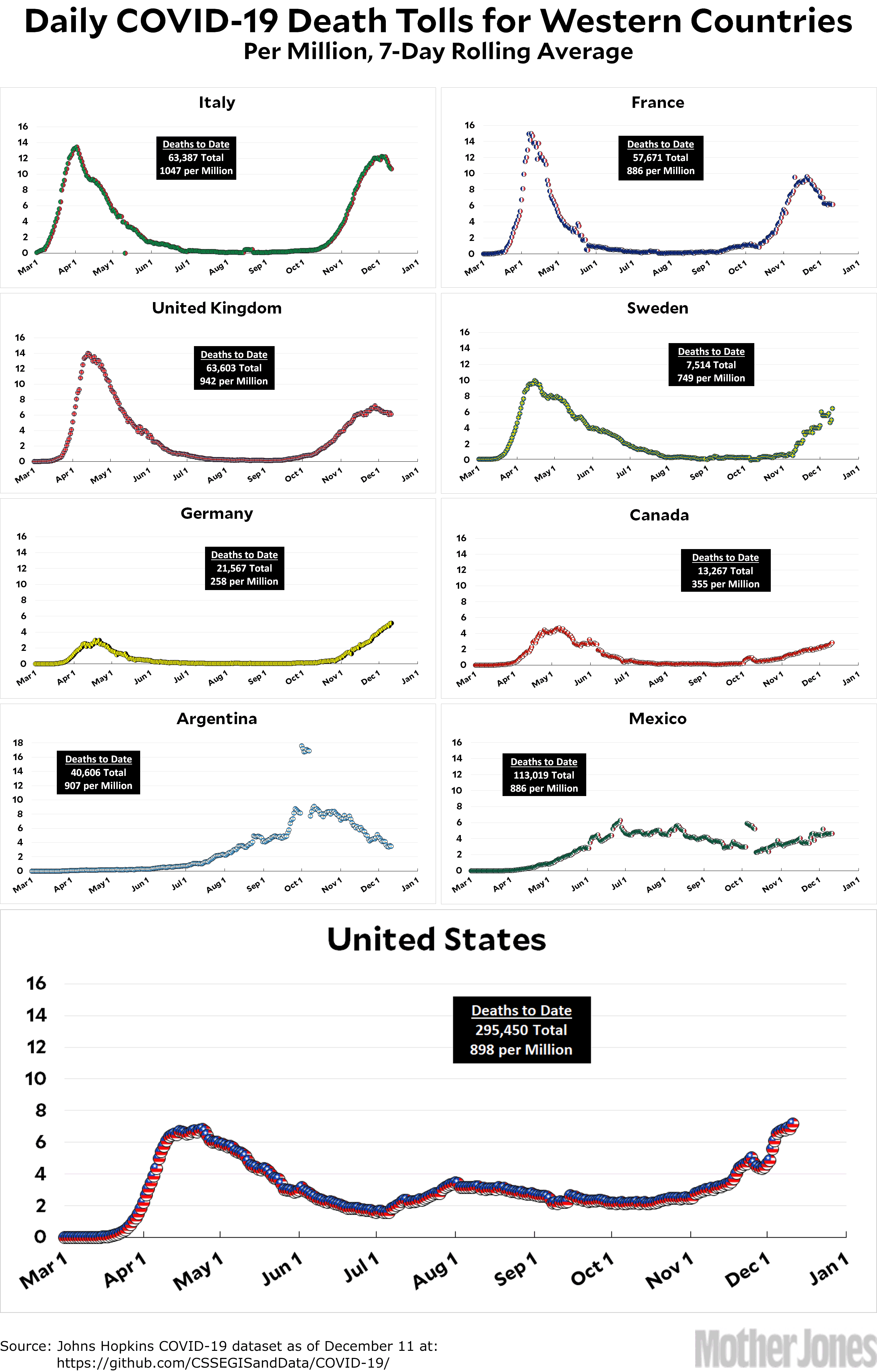
This is Hilbert peering attentively out of the ferns at . . . a bug? A bird? His sister? When he was finished he rolled around for a bit, got himself as dirty as possible, and then wandered into the house. Naturally.

Oh great. This should help make everyone more confident that the Pfizer vaccine isn’t being rushed through due to political pressure:
White House Chief of Staff Mark Meadows on Friday told Stephen Hahn, the commissioner of the Food and Drug Administration, to submit his resignation if the agency does not clear the nation’s first coronavirus vaccine by day’s end, according to people familiar with the situation who spoke on the condition of anonymity because they were not authorized to discuss what happened.
First of all, this accomplishes nothing. The FDA was apparently planning to finish the authorization by Saturday morning, so this speeds things up by only a few hours or so. Second, everyone knows that Donald Trump is pushing this because he’s convinced that Deep State agents in the FDA and the CDC deliberately slow-walked emergency approval until after the election so he wouldn’t get credit for it. Third, when all is said and done, US authorization will be a grand total of ten days behind Britain’s and ahead of practically everyone else. This is really not overwhelming evidence of slow work from American agencies.
On the other hand, it makes Trump look like a tough guy, even though he obviously waited to do anything until there was really nothing left to do. It’s a completely empty threat, and it comes after months of practically ignoring the COVID-19 pandemic at the federal level.
Is there a price to pay for this? Probably. Public confidence in the vaccine is important, and it’s already been shaken a bit by the report of allergic reactions in Britain. The best way to keep confidence high is to keep politicians out of it and let professionals do their job. The last thing we should do is give people who are already skeptical even more reason to wonder if the vaccine is being forced on them by glory-hound politicos.
Margot Sanger-Katz writes about the difficulty of choosing a health care plan:
The range of choice is generally heralded as a good thing….But it turns out in real life most people are terrible at picking the health plan that is right for them. Health insurance is a complicated financial product, and study after study has shown that people routinely pick bad plans, even choosing options that leave them worse off financially in every possible scenario.
Needless to say, this is a pretty good argument for universal health care. But let’s put that aside and move on:
But what is the alternative to choice? Amanda Starc, an associate professor of management at Kellogg School of Management at Northwestern University, said there was evidence that people really did want different things from health insurance. About a third of people 65 and older are currently enrolled in private Medicare Advantage plans, a share that is large enough to suggest that many would be less happy with only the choice of government Medicare.
That’s true. Enrollment in Medicare Advantage plans has grown substantially over the past couple of decades:
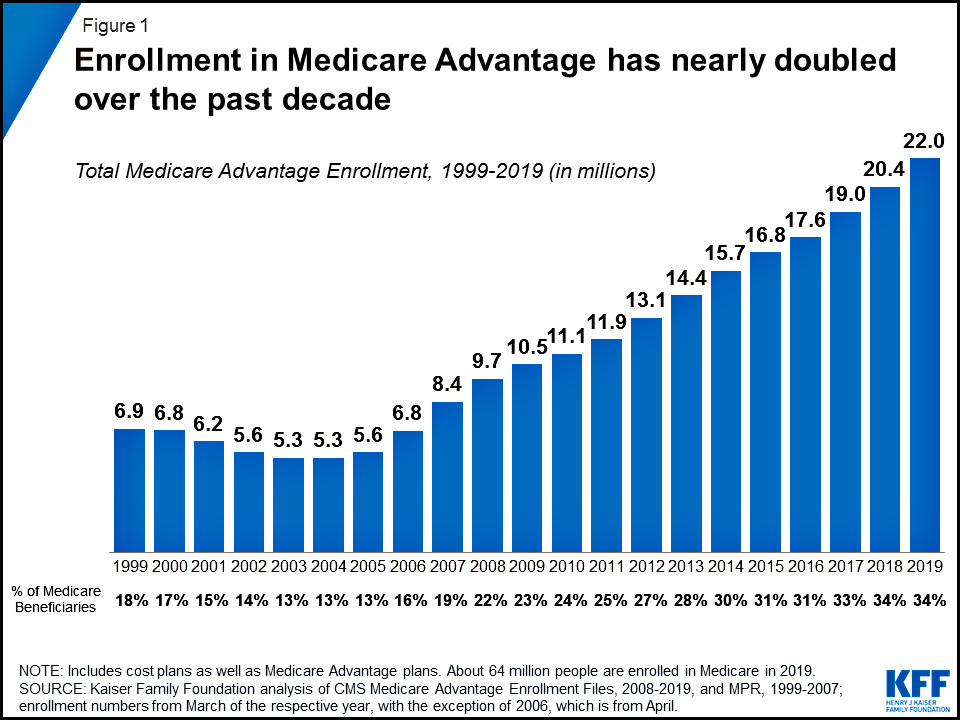
But why has this happened? Is it because people love choice?
Maybe. But there are other factors at work here. Up through 2010 or so, the federal government reimbursed MA plans at a substantially higher rate than traditional Medicare, which meant that MA plans could afford to be more generous. Obamacare attempted to rein this in, but when you add everything up (reimbursement rates, quality bonuses, lower bid rates, etc.) MA plans were still more generously funded than traditional Medicare even after Obamacare took effect. In other words, people increasingly chose MA plans not because they loved choice so much, but because they were genuinely able to offer better benefits.
They also offered something else that turned out to be highly prized by customers. Here’s the conclusion of a study from the Urban Institute:
Our multivariate analyses found that county-level MA penetration growth was related to access to $0 premium and four-or five-star plans, implying that beneficiaries choose MA more frequently where MA plans are more generous or higher quality. MA plans with a four-star rating or higher have higher benchmarks to bid against and a higher rebate percentage to pass on to beneficiaries through extra benefits, and five-star plans can offer year-round open enrollment. Research shows that $0 premiums and extra benefits feature prominently in MA plan advertising (Cai et al. 2008), suggesting that plans see generosity as a major selling point.
People might like choice, but they like $0 premiums even more! This is pretty popular among Obamacare plans too. This should not come as a great surprise to anyone.
The pandemic recession is disproportionately damaging the careers of women — so much so that some experts call it a “shecession.”…One recent study found a disproportionate decline in employment for women of prime working age, 25 to 55, compared with men — and especially so for mothers.
This is one of those things that depends an awful lot on which statistics you choose to look at, and I don’t doubt that working-age women with small children have been affected disproportionately. That said, here’s the headline unemployment rate for prime-age workers:
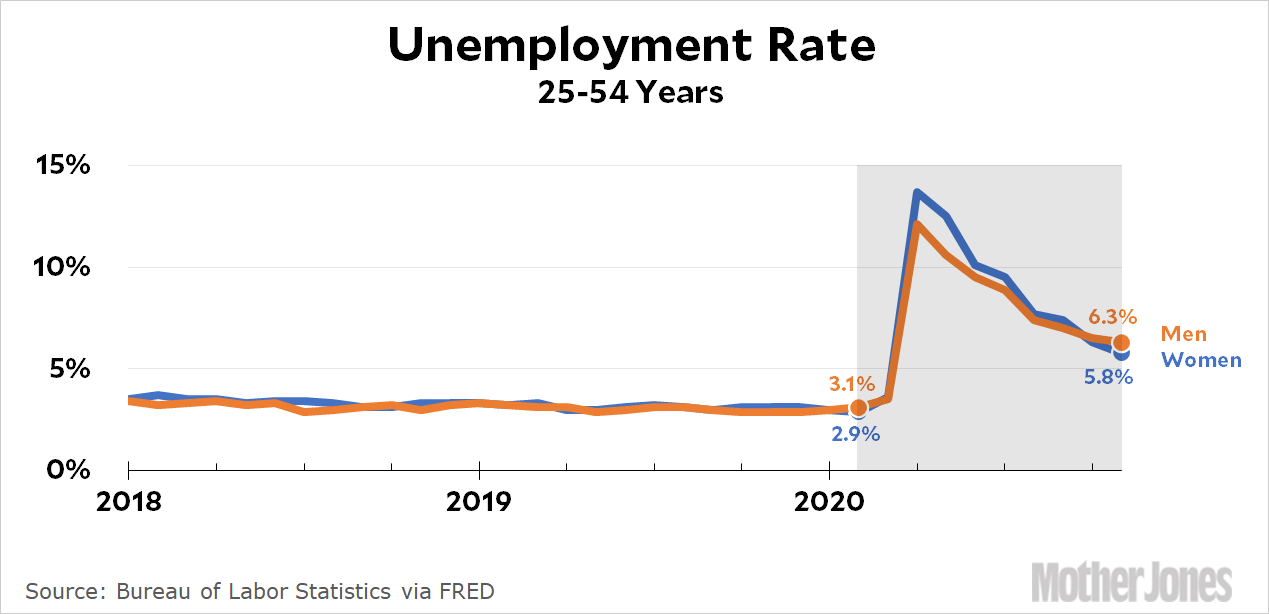
If you cherry pick just the first few months of the recession, unemployment went up more among women than men. But that faded away, and by November the unemployment rate since the start of the recession had increased 3.2 percentage points for men and only 2.9 percentage points for women.
But wait. Maybe more women dropped out of the labor force and were no longer counted among the unemployed. Here’s the basic labor force participation rate:
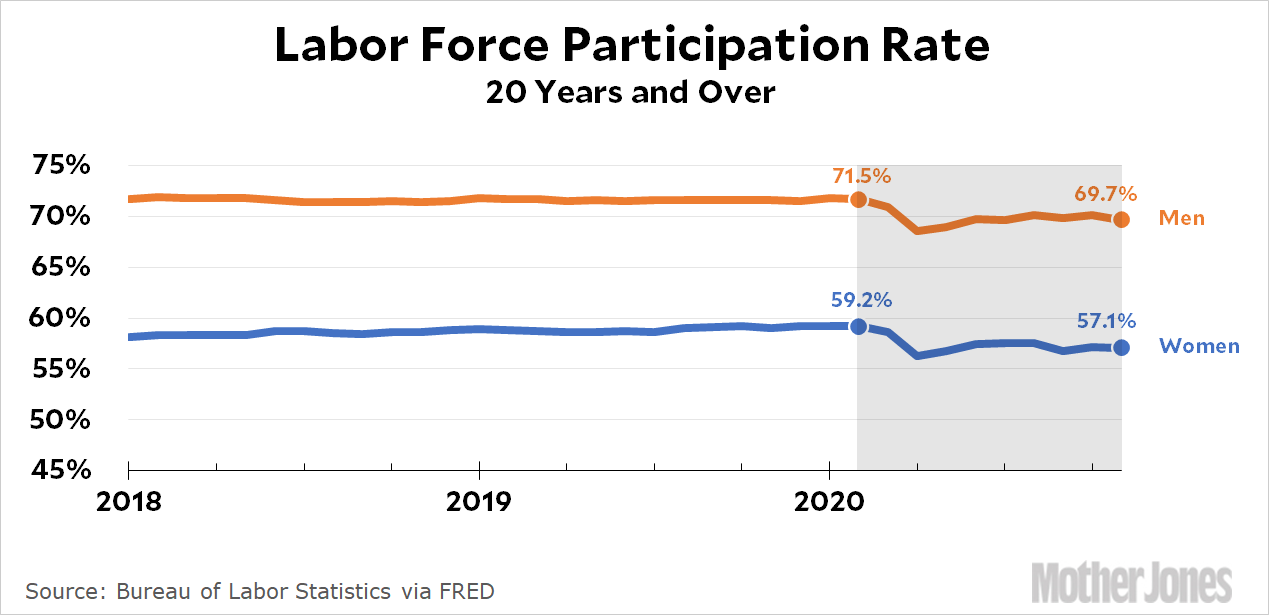
Since the start of the recession, the labor force participation rate for adult men has gone down 2.0 percentage points. For adult women it’s gone down 2.1 percentage points. There’s really not much difference.
As I said, I don’t doubt that the recession has been harder on working mothers than on other groups, and if you dig into the numbers you can probably see that. Nonetheless, the overall effect of the pandemic recession has been pretty evenly split between men and women. There’s very little evidence of a “shecession.”
Here’s the coronavirus death toll through December 10. The raw data from Johns Hopkins is here.
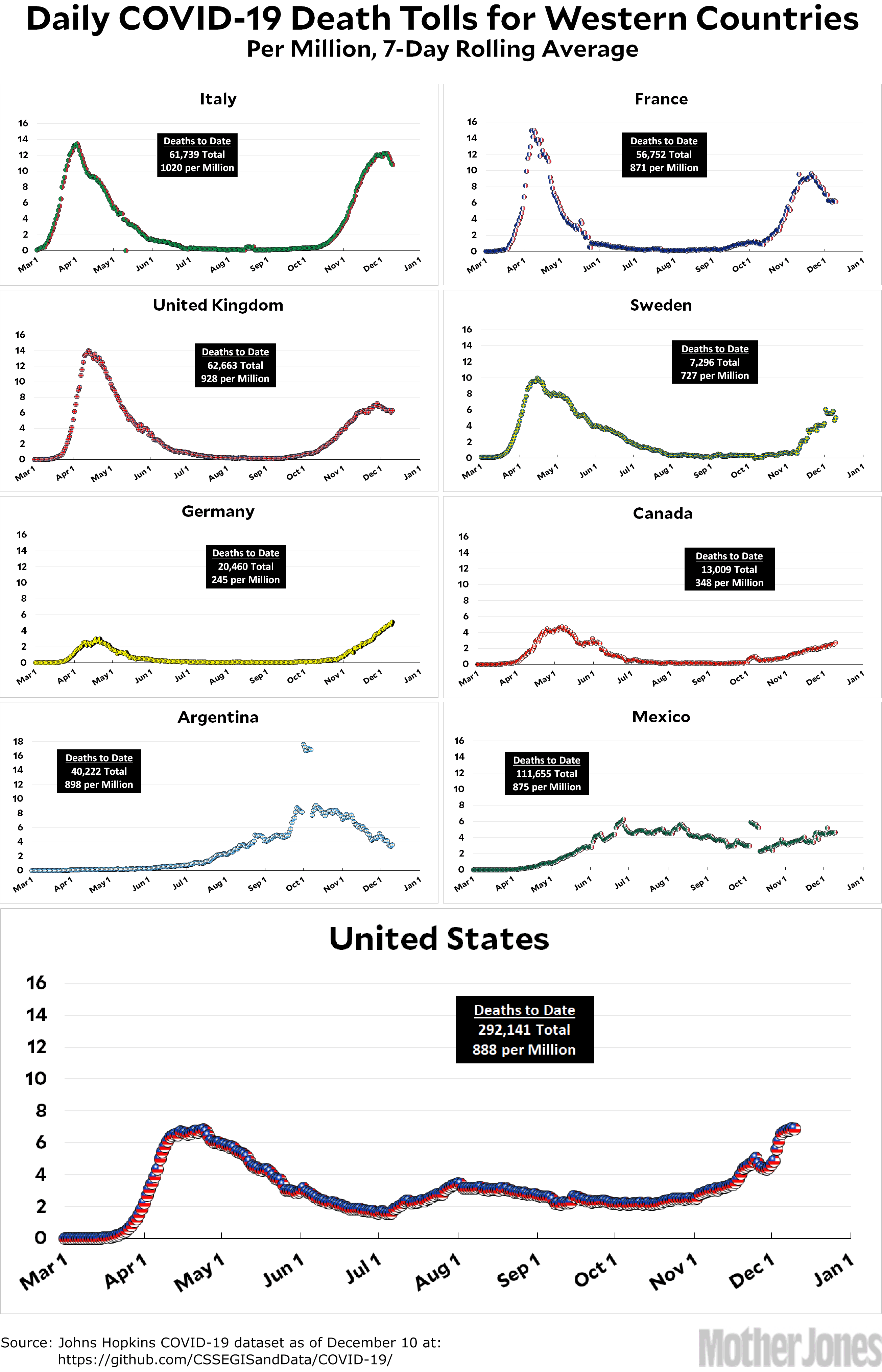
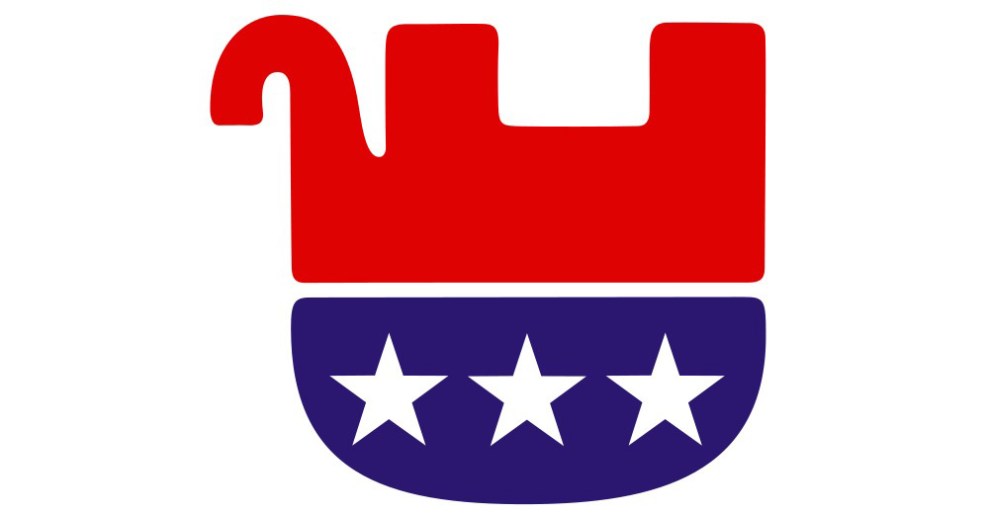
As you know, 17 states with Republican attorneys general have sued four other states in an effort to overturn the election results. Their arguments are farcical and the Supreme Court is highly unlikely to hear the case, but that hasn’t stopped plenty of Republican lawmakers from piling on:
I’ve come to have very low expectations that elected Republicans will do the right thing. But even I’m stunned that 106 of them would sign their name to such an insane and embarrassing scheme. https://t.co/t2ZxbEU0Bk
— Stephen Hayes (@stephenfhayes) December 10, 2020
That’s more than half of all Republicans in the House. Half! And they’re signing onto a brief that reads like it was written by a ten-year-old, all for no reason except to demonstrate a slavish hatred of Democrats to their base. They aren’t signing it because they’re otherwise afraid of retribution from Donald Trump—he’s a powerless lame duck at this point—they’re signing it because they’ve created both a base and an entertainment complex that will punish them if they don’t continue to feed it ever larger and bloodier chunks of red meat.
Things like this make it clear that it’s no longer enough to simply denounce Donald Trump. Or even to denounce Trumpism. From the very start the big question about Trump has been how it was possible for the Republican Party to nominate him in the first place. But the answer doesn’t depend on anything to do with Trump himself; it lies in how the party evolved during the decades from the Gingrich revolution to Trump’s eventual nomination and election. That means dealing with Gingrich himself; with Whitewater; with Fox News; with endless money raising scams; with Iraq; with “voter fraud”; with growing toleration of white racism; with Benghazi; with Hillary’s emails; and with everything else that the GOP has become over the years.
Anyone opposed to Trumpism needs to deal brutally and honestly with all this, including their own roles in it. That’s not easy, but there’s no denying what the Republican Party has become today and there’s no denying how it got here. Every lurch down that road, many of which probably seemed harmless at the time, eventually created a monster that no one could control. Until you face up to this, you’re still just fooling yourself about what happened to post-Reagan conservatism.
Here’s a smiling underwater hippo at the San Diego Zoo. This is another shot that I was able to get only because of my giant rubber lens hood. Without it, the reflections off the glass were so glaring that you could hardly make out anything in the water.
